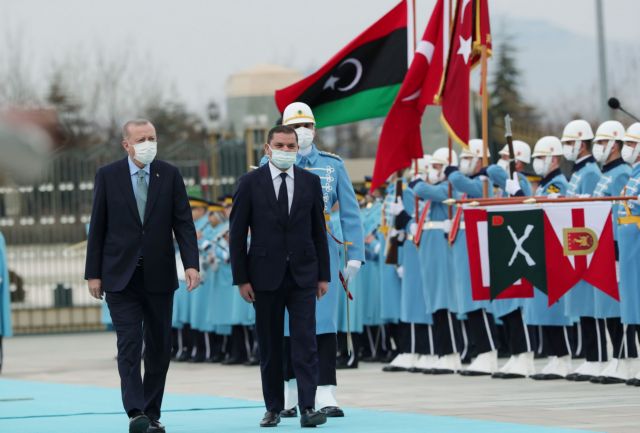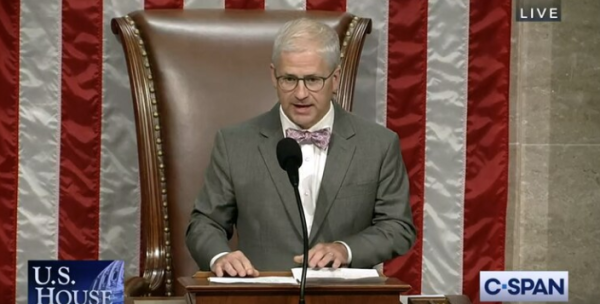
Turkey’s latest attempt this week to illegally stake out maritime zones in the central and east Mediterranean by signing another agreement with the provisional – and now expired – Libyan government in Tripoli, and the immediate rejection by the strife-plagued country’s legislature, dominated diplomatic activity in Athens a day later.
The agreement, a MoU potentially allowing Turkey and Turkish firms the “right” to explore for hydrocarbons as close as seven nautical miles from the fifth largest island in the Mediterranean – Crete – was greeted with celebratory reaction by Turkish officials and media in Turkey. Conversely, it generated sharp reactions by Athens, the EU and, just as importantly, Libyan lawmakers, especially in the east of the large North African country.
Among others, the up-until-now Libyan oil minister, Mohamed Aoun, was forced out of office this month after denouncing the provisional Dbeibeh government in Tripoli for passing a “…suspicious oil agreement with Turkey to exploit oil and gas in offshore area near Tobruk in eastern Libya.”
What followed was a high-profile reference by Libya’s foreign minister, Najla El Mangoush, who spoke next to Turkish FM Mevlut Cavusoglu during a joint press conference, to the fact that the original 2019 agreement between Tripoli and Ankara has not been ratified. The latter also dampened the initial festive atmosphere by Erdogan-led and poll-trailing AKP government.
Hours after a beaming Cavusoglu penned the latest MoU in Tripoli on Monday, the speaker of Libya’s House of Representatives, Aguila Saleh, said the previously unannounced deal was “illegal”.
Saleh and other lawmakers said the provisional Dbeibeh government’s mandate has ended, meaning that the latter is not authorized to broker international deals. Additionally, opposing Libyan lawmakers said the country is deprived of maritime zones under the contentious agreement.
Opposition to the latest instance of “Turkography” in Mediterranean waters was summed up later on Monday evening, when an announcement by the Libyan House of Representatives stated that the agreement “…isn’t even worth the ink with which it was printed.”
Latest News

Airbnb: Greece’s Short-Term Rentals Dip in March Amid Easter Shift
Data from analytics firm AirDNA shows that average occupancy for short-term rentals dropped to 45% in March, down from 49% the same month last year.

Easter Week in Greece: Holy Friday in Orthodoxy Today
At the Vespers service on Friday evening the image of Christ is removed from the Cross and wrapped in a white cloth

Meloni and Trump Meet in Washington, Vow to Strengthen Western Ties
“I am 100% sure there will be no problems reaching a deal on tariffs with the EU—none whatsoever,” Trump stressed.

ECB Cuts Interest Rates by 25 Basis Points in Expected Move
The ECB’s Governing Council opted to lower the deposit facility rate—the benchmark for signaling monetary policy direction—citing an updated assessment of inflation prospects, the dynamics of underlying inflation, and the strength of monetary policy transmission.

Current Account Deficit Fell by €573.2ml Feb. 2025: BoG
The improvement of Greece’s current account was mainly attributed to a more robust balance of goods and, to a lesser extent, an improved primary income account

Hellenic Food Authority Issues Food Safety Tips for Easter
Food safety tips on how to make sure your lamb has been properly inspected and your eggs stay fresh.

Greek Kiwifruit Exports Smash 200,000-Ton Mark, Setting New Record
According to data by the Association of Greek Fruit, Vegetable and Juice Exporters, Incofruit Hellas, between September 1, 2024, and April 17, 2025, kiwifruit exports increased by 14.2%.

Easter Tourism Boom: Greece Sees 18.3% Surge in Hotel Bookings
Among foreign markets, Israel has emerged as the biggest growth driver, with hotel bookings more than doubling—up 178.5% year-on-year.

Greece to Launch Fast-Track Tender for Offshore Hydrocarbon Exploration
Last week, Papastavrou signed the acceptance of interest for the two Cretan blocks, while similar decisions regarding the two Ionian Sea blocks were signed by his predecessor

American-Hellenic Chamber of Commerce to Open Washington D.C. Branch
AmCham's new office aims aims to deepen U.S.-Greece economic ties and promote investment and innovation between the two countries







![Πλημμύρες: Σημειώθηκαν σε επίπεδα ρεκόρ στην Ευρώπη το 2024 [γράφημα]](https://www.ot.gr/wp-content/uploads/2025/04/FLOOD_HUNGRY-90x90.jpg)




![Airbnb: Πτωτικά κινήθηκε η ζήτηση τον Μάρτιο – Τι δείχνουν τα στοιχεία [γράφημα]](https://www.ot.gr/wp-content/uploads/2024/07/airbnb-gba8e58468_1280-1-90x90.jpg)

























![Airbnb: Πτωτικά κινήθηκε η ζήτηση τον Μάρτιο – Τι δείχνουν τα στοιχεία [γράφημα]](https://www.ot.gr/wp-content/uploads/2024/07/airbnb-gba8e58468_1280-1-600x500.jpg)


 Αριθμός Πιστοποίησης
Αριθμός Πιστοποίησης